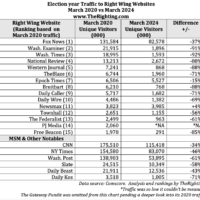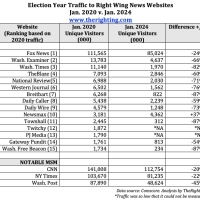
You can add Wall Street investors to the pollsters and prediction market gamblers who believe Kamala Harris has begun to derail Donald Trump’s presidential campaign. The evidence: their treatment of the right wing media companies we track – all of which just reported unimpressive ad and retail sales results for the quarter that ended in June. While the financial reports are revealing, what’s just as interesting is what has happened to their stocks since July 21, when President Biden bowed out of the campaign. The overall market was flat, yet three of our four companies’ share prices slipped as of Friday.
–Truth Social parent Trump Media and Technology Group (TMTG): down 35.3 percent
–Social video platform Rumble: down 2.3 percent
–E-retailer Public Square: down 16.0 percent
–Radio power Salem Media Group: up 5.9 percent
The stock gyrations are meaningful because politics is at the center of the companies’ pitch to investors. They say that they can profit from a new, and still untested, phenomenon – millions of MAGA fans who long to do business with a so-called “parallel economy” of media providers and e-retailers who share their nationalist and religious values.
So, what happens if Trump – the man who has fueled MAGA – loses? Do these companies have what it takes to keep going without him?
Here’s what their latest reports and executive comments tell us:
TMTG
Trump has had trouble keeping his political campaign on message. And he has the same problem at TMTG. Truth Social’s pitch to investors is simple: This will be Trump’s digital home. His fans will have to go there to find him.
No wonder TMTG lost 12.6 percent of its value over the five days ending on Friday –after Trump agreed to let Elon Musk interview him on X, Truth Social’s chief, and far bigger, competitor.
It was a bridge too far, even for investors who were impervious to the candidate’s widely reported fabrications, racism, insults, and incoherence on the stump.
TMTG also hurt itself with its second quarter financial report, released on Friday, August 9 after the market closed. Although candidate Trump decries Harris’ reluctance to take press questions, the company he controls – with about 60 percent of its stock – released the report without notice and without giving other investors an opportunity to ask questions.
TMTG generated a mere $836,900 in ad sales in the quarter, a 29.8 percent drop vs. the same period in 2023. The company says the decline was largely due to a “change in the revenue share with one of our advertising partners” – unnamed – who had chipped in to “improve the Company’s short-term…financial position” before March when TMTG merged with publicly traded Digital World Acquisition Corp.
Truth Social’s ad sales covered a small fraction of the company’s $19.5 million in costs and operating expenses — which increased 295 percent from the period last year.
To be fair, that included one-time, merger-related bonus payments of $6.1 million for employees and an unnamed TMTG director.
The income statement benefited from the elimination of nearly $20.6 million in interest expenses on the debt Trump’s company incurred last year. Most of the holders swapped their debt for TMTG stock. The total number of TMTG shares increased about 90% to 166.7 million.
All told the company loss per share dropped to 10 cents from 26 cents.
Despite its struggles and unproven operating prowess, several institutional investors owned TMTG stakes at the end of Q2. The list includes Vanguard Group (2.9 million shares), BlackRock (2.2 million), State Street (about 440,000), Greenwich Wealth Management (350,000), and Hudson Bay Capital Management (202,000).
That has helped to give TMTG an extraordinarily high valuation of $ 4.4 billion – just about even with Barry Diller’s IAC, which includes established digital publications People, Food & Wine, the Daily Beast, Real Simple, Travel + Leisure, AllRecipies, and Brides.
Salem Media Group
Salem broadcasts what it describes as “Christian and conservative content” – including commentators Hugh Hewitt, Dennis Prager, Sebastian Gorka, Charlie Kirk, and Dinesh D’Souza — primarily via 91 radio stations it owns or operates as well as 2,900 affiliates.
So it was fitting that the company opened its eight-minute shareholder meeting in May with a prayer.
“Father, we know we have challenges,” director Richard Riddle said. “But we know you are by our side helping us through that.”
The company could use some divine help. It’s busily selling assets to keep up with debt obligations at a time when advertisers are shifting dollars from radio to audio streaming services and podcasts.
Investors abandoned hope and Salem gave up its NASDAQ listing in January. Over-the-counter traders can buy about four Salem shares for $1.
The Q2 numbers did little to strengthen anyone’s faith. Yes, it reported $2.3 million in net income, up from a $7.1 million loss last year, on revenues of $60.6 million, down 7.9 percent.
But much of the improvement in Salem’s bottom line came from $5.7 million in asset sales, including three radio stations in Nashville and one in Honolulu, as well as a gain from the sale in December of its right wing Regnery book publishing operation.
Meanwhile the radio stations Salem continues to own appear to be struggling — unusual in an election year. Their revenues dropped 3.3 percent to $46.7 million due in part to “reduced time spent listening, particularly on AM radio stations.” Their operating income dropped 32 percent to $4.4 million.
Digital revenues improved 10 percent to $11.9 million, but that’s largely due to rising subscriptions to the company’s financial news and advice sites at Eagle Financial Publications and DayTradeSPY.
The digital ads that support other sites fell by $200,000. The company attributes the decline to “Facebook algorithms that limit political content, the growing use of browsers that block third-party cookies limiting advertising, and the overall state of the economy.”
Public Square
Public Square is a faith-based company that has a problem with heretics. Non-believing investors sent the stock price down 76.8 percent over the last year, and 24.6 percent over the last three months.
That has finally gotten under CEO Michael Seifert’s skin.
“Simply put, we do not believe that the current price of our stock is in any way, shape, or form accurately reflective of our business,” he said last week. “We can speculate as to where this disconnect is. But, at the end of the day, we believe the market hasn’t fully realized what we built and where we’re going.”
He might have helped himself by holding an earnings call that lasted more than 14 minutes and also took questions from investors. There would probably be plenty.
The company that Seifert built to promote “life, liberty, faith, and family” lost $11.2 million in the second quarter on revenues of nearly $6 million. The lion’s share of sales came from two businesses it bought; the company didn’t report their comparable sales from last year.
About half of all Q2 revenues came from the Financial Technology segment created with the March acquisition of Credova, a company that offers buy-now-pay-later deals for gun fans. Public Square says that the segment’s gross merchandise value dropped 7 percent to $13.3 million vs. last year’s second quarter mirroring “broader industry trends” that show “softer market conditions” in gun sales.
Another 38 percent of revenues came from the EveryLife line of “life affirming baby products” it acquired in February 2023 and launched five months later. It plans to expand to South Korea later this year with help from the country’s “largest retailer” as well as “a number of the largest Christian churches.”
The Marketplace business that Public Square initially focused on — offering a one-stop shop for “consumers that are drawn to patriotic values” — generated $726,638 in the quarter, up 37 percent vs. last year. The company doesn’t identify how much came from commissions it receives from the retailers who fulfill orders as opposed to ad sales on its site.
While the numbers are uninspiring, Seifert insists that he and other backers remain true believers in the prospects for a company built for a MAGA-based parallel economy.
An unnamed board member just loaned the company $10 million for a 10-year note that will pay 9.75% in interest but also can be swapped for stock.
This could help Public Square to offer multiple payment options this holiday shopping season.
Meanwhile, Seifert, CFO Brad Searle, and investor Donald Trump Jr. agreed to hold on to their Public Square shares for the next 12 months. “We’re patient,” the CEO said. “We are just getting started.”
Rumble
Rumble CEO Chris Pavlovski predicted that this election year would be the right-wing social video platform’s Super Bowl. Turns out it’s also a series of heavyweight championship fights.
Rumble recently joined X’s antitrust suit against the World Federation of Advertisers’ Global Alliance for Responsible Media (GARM).
GARM was founded in 2019 to help advertisers create brand safety standards. The group cited instances where companies found their digital messages next to hate speech, child pornography and promotions of terrorism – and, most shockingly, tied to a Facebook livestream in New Zealand by an anti-immigrant white nationalist who went on a shooting spree that killed 51 people at two mosques.
But right wingers, including House Judiciary Chairman Jim Jordan (R-OH), charge that GARM was designed to prevent people from hearing their views.
“The so-called standards were, in fact, an agreement among competing advertisers and ad agencies not to advertise with sites like Rumble and X which has clearly created an artificial headwind for our business,” Pavlovski told investors on August 12.
The Federation suspended GARM on August 9 saying that the allegations “misconstrue its purpose” creating a resource-draining “distraction.” The lawsuit apparently remains alive at a U.S. District Court in Texas.
Rumble’s lawyers have also weighed in for two anti-trust suits against Google. They were heartened by a federal court’s August 5 ruling supporting the Justice Department’s charge that the search giant is a monopoly.
Due to GARM and Google “attracting brand advertisers has been more difficult than anticipated,” Pavlovski said. “The fact that we have been put into this position makes me sick to my stomach.” It also has increased Rumble’s dependence on direct-response ads.
These issues don’t fully explain the 12.5 percent year-over-year increase in Rumble’s Q2 operating loss – to $38.8 million on revenues of $22.5 million, down 10 percent. The net loss improved 9.1 percent to $26.8 million largely due to an $8.5 million lift from a change in the value Rumble ascribes to warrants used its 2021 merger with a publicly traded entity.
Pavlovski called the results “solid” but added that “the excitement lays ahead.” CFO Brandon Alexandroff added that the execs expect cash flow to break even next year.
They’ll probably need a lot more help from attention-grabbing political news.
Even with Trump and Biden’s June debate, Rumble’s average estimated minutes watched per month in Q2 came in at 8.5 billion, down 1 percent from Q1 and down 28 percent from the same period last year.
The company credits the election buzz for the 13,342 hours of uploaded video per day, up 7.4 percent from Q1 – but a less than 1 percent improvement from last year’s Q2.
Pavlovski is eager to assure investors that there’s more to Rumble than politics. The client list for Rumble’s cloud business – which handles TMTG and Public Square — just added the NFL’s Miami Dolphins and is talking to North Macedonia’s newly elected center-right Prime Minister Hristijan Mickoski about a cloud deal with the government.
Pavlovski clearly salivates for that business. He referred to the former Yugoslav republic by the controversial name Mickoski uses: “Macedonia.” That runs counter to an agreement the country made 2018 to win Greece’s support for it to join NATO. Greece fears that the country’s use of “Macedonia” – without the modifier “North” – could signal that it has designs on the adjacent Greek region with that name.
























